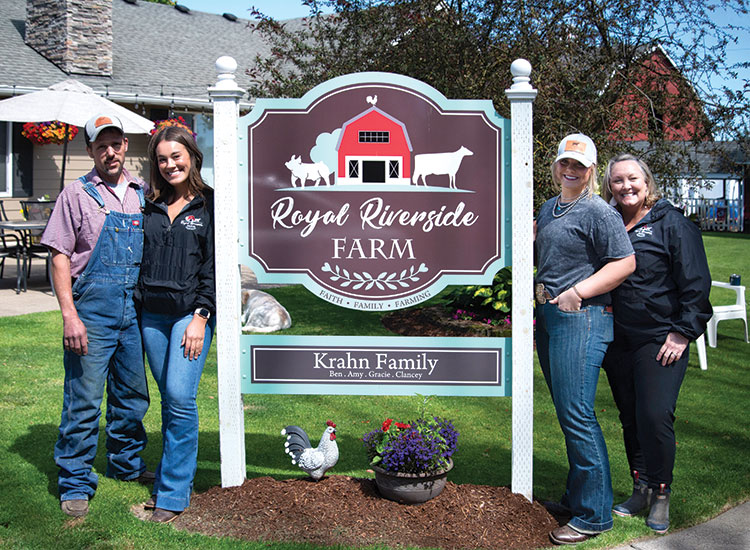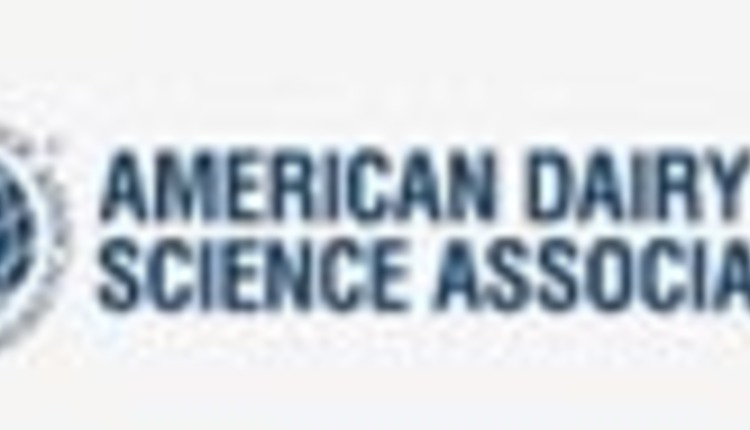The author is an associate editor for Hoard’s Dairyman.

Not far outside of the small western Oregon city of Albany, a friendly sign edged with bright teal welcomes visitors to Royal Riverside Farm. Down the driveway, those who stop find a place to stock up on fresh milk and other local items just a few hundred feet away from the picturesque red barn where the Jersey milk is made and processed.
It’s hard to imagine that just over 12 years ago, none of this existed. Ben and Amy Krahn purchased their little farmstead “like a pig at an auction” at a foreclosure sale in 2010. “There was nothing, not even a light bulb in the house,” Amy recalled of fixing up the property.
Although it took time before the family could move in, what Ben and Amy had from the beginning was a vision for the life they wanted to give their two young daughters, Gracie and Clancey. Both dairy farm kids themselves, Ben and Amy, who met showing cows, wanted their girls to have the experience of working with animals to exhibit in youth programs. In addition to being parents, they knew the importance of developing young people from the perspective of an educator — Ben used to teach animal science and run the dairy at Oregon State University, and Amy was a college and high school teacher.
For a while, they didn’t have anywhere to make that vision work. Ben’s family farm in Wisconsin was sold when the family moved to Oregon when he was 18, and Amy’s parents turned her grandparents’ dairy into an orchard. Finding the foreclosure acres in Albany seemed like a glimmer of opportunity.
So, they fixed up the house. They put up a barn with pasture access, a 4-stall milking setup, and heifer pens around the corner. The girls poured concrete. With Gracie just starting 4-H, the timing was perfect to get some show heifers, and Clancey soon followed. The show dream was becoming a reality, and that remains true today as they have successfully exhibited at many local and national shows.
Buying property and building a barn might seem like a lot of work to put into showing cattle, and it was. But Ben and Amy didn’t just want their kids to take their animals in the ring; they wanted them to see and be a part of the everyday care that went into it. Clancey raises the heifers and keeps the milk bottling equipment sanitized. Gracie milked every night until she recently moved to continue her education at the University of Wisconsin-Madison, and both girls halter break every calf for showing and selling in addition to other farm jobs. “It’s teaching them those important lessons and character traits that are really hard to learn,” Amy said.
A new venture
One life lesson they learned early on, though, was that there’s a thin profit margin in showing. They needed a way to support their hobby as the herd expanded.
For years, the milk from the Krahns’ cows was fed to the show pigs they also raised. However, as Ben and Amy looked at how to make their business work, they knew there was more opportunity there and early on began discussing the idea of bottling milk. Amy’s grandparents had run a milk bottling business, so the idea of providing for their community in that way had taken root in the back of their minds. At first, though, they decided it wasn’t quite the right time.
The idea reared its head another time, and it still wasn’t a good fit. But by the third time the topic came up, they felt it was something they needed to do and decided to begin processing and marketing milk in 2018. “Probably the scariest thing for us when we first started was that initial leap of faith,” Amy said.
During the discussion stages, Ben visited other small processing facilities to get quotes and ideas. They connected with a small manufacturer to determine a plan for their system. Finally, the vat pasteurizer began running, and they had their first glass bottle of cream line milk. Now, they just had to find customers.
That didn’t turn out to be too hard for the self-described “people” people who enjoyed sharing their product with their greater community. They set up at farmers markets and were able to connect with consumers from many different backgrounds who were curious about their milk.
“It’s interesting to find a common ground because then you can talk to someone you’d probably never talk to about something you both like,” said Clancey, who often worked the farmers markets along with her dad.
“To be feet on the ground, asking questions and visiting with people, I find that fascinating,” agreed Ben of their experiences.
That friendly attitude carried over into their retail customers. Today, Royal Riverside milk is in 50 stores and coffee shops nearly all over the state, and Ben and Amy call every customer each week to talk about their order and the farm. Getting people excited about milk again is one of their goals, and the relationships they build and fun flavors they offer (from vanilla latte to peaches and cream) make it possible.
Community connections
The small nature of the Krahns’ business that allows them to call all of their customers and be flexible to their needs also turned out to be beneficial when the pandemic struck. Some customers started coming directly to the family, and although they didn’t sell milk at the farm at that time, they made it work. Their customers were very appreciative to be able to get a local product, and being so close to town made it convenient. The wheels began to turn again for the Krahns, and in contrast to the bottling, they jumped at the first opportunity to open a store at the farm.
A garden shed in front of the house was cleaned up and revamped for what has now become The Classy Cow Farmstand, where their milk is sold in addition to meats, produce, and other local items. Amy operates it each Friday and Saturday, and it’s become a regular part of many people’s weekend plans, she said.
With two former Oregon Dairy Princesses on the farm (Amy in 1996 and Gracie in 2021), it’s no surprise that the Krahns soon saw their farm stand as a perfect opportunity to show their customers what dairy farming looks like and how much farmers care about their animals. In addition to the stories and facts they share at the store and on their social media pages, farm tours have become a hit.
“It’s not just the little kids that find it interesting. A lot of time it’s the moms and dads and grandmas and grandpas that are asking questions about all of these things that we take for granted,” said Gracie, who leads many of the tours. “The impact the farm store has made and what the tours have done, not only for a handful of people but really for our whole community, is very inspiring.”
Community is what’s at the heart of everything the Krahns do, whether that’s their geographic community or their dairy, Jersey, and show families. Both girls are active with junior Jersey activities, and the farm regularly consigns animals for other breeders to develop and be successful with. “You don’t have to blow another person’s candle out to make yours shine brighter,” said Amy of their enthusiasm for their fellow Jersey breeders.
There might not have been any light bulbs in the house when they bought the property, but Royal Riverside Farm’s light is shining brightly now and pointed toward the passion that drove them to the farm — the dairy cow.









